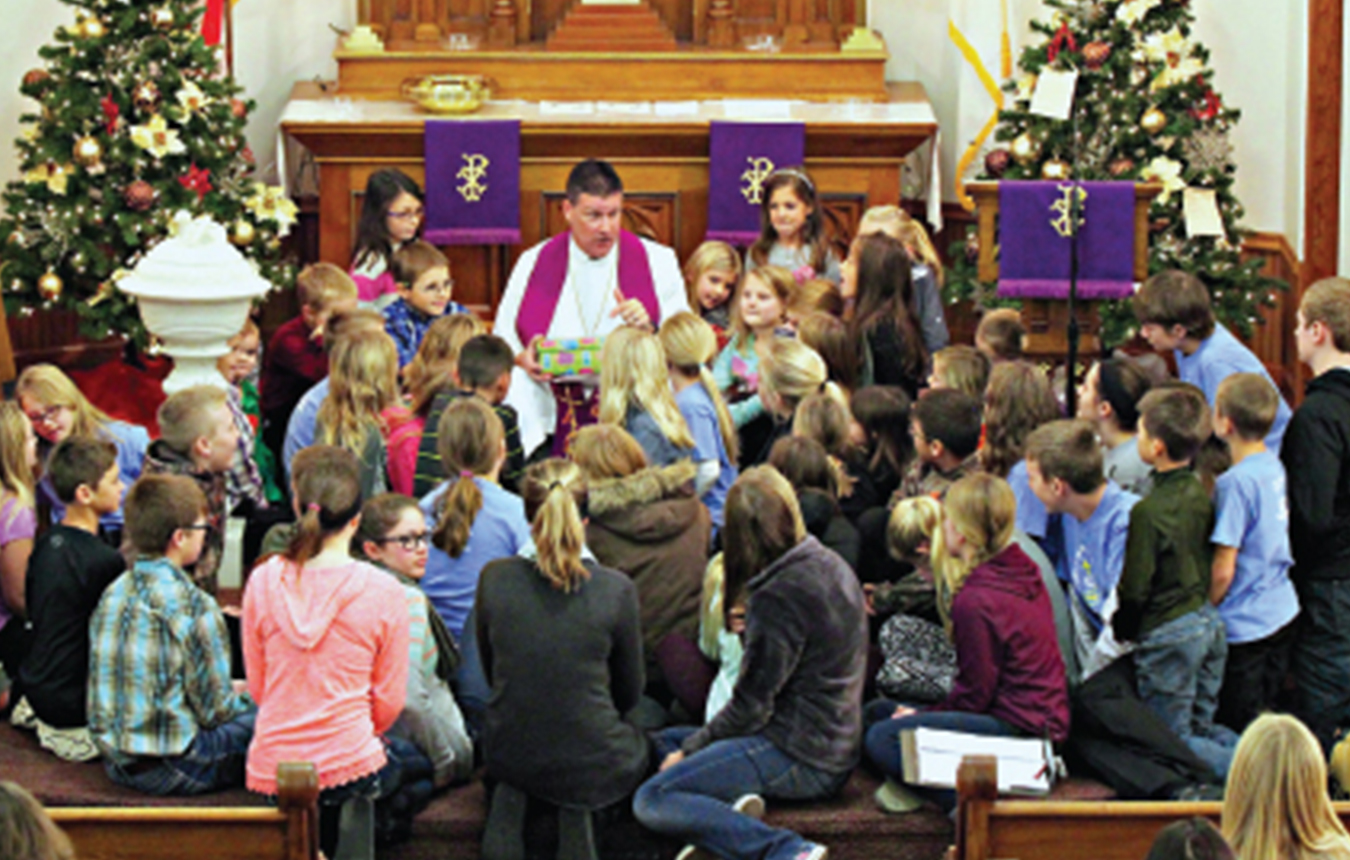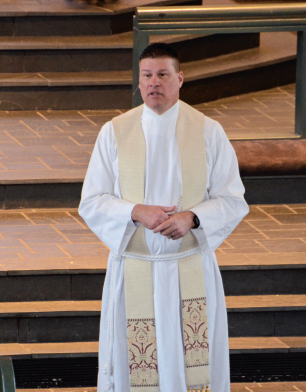
Concordia Seminary Newsroom
Host congregations serve vital role on campus
Blessings go both ways

Rev. Brad Birtell of St. John Lutheran Church in Columbus, Neb., stood before the Concordia Seminary community in chapel in October. For three days he preached as part of his church’s role as a host congregation of the Seminary for the 2016-17 academic year.
He spoke with particular passion during one sermon about the parable of the persistent widow in Luke 18. Birtell shared the story of how he and his wife “decided after a lot of prayer that this was not the place for us” a month and a half after they first came to the Seminary.
Despite their doubts then about whether Birtell should continue his Seminary studies, the couple chose to attend Zion Lutheran Church in Mascoutah, Ill., where Birtell had been placed for his Resident Field Education.
“It was through the love and the encouragement of Zion’s Pastor Glen Thomas, his faithful wife, Ann, and those amazing people and that incredible congregation that totally changed our course in life,” Birtell told the students in chapel. “I have to tell you very honestly that Christie and I totally believe if it wouldn’t have been for them and God’s grace at that moment in our life that I wouldn’t be a pastor in the Lord’s Church and I certainly wouldn’t be standing before you here today.
“We are so very blessed to serve in your midst.”
Birtell’s presence at the Seminary in October was a blessing to him, but it also was a blessing to the Seminary. Each year, Seminary President Dr. Dale A. Meyer asks one church to take on the year-long role of serving as a host congregation. Since the Seminary’s Chapel of St. Timothy and St. Titus is not a congregation of The Lutheran Church—Missouri Synod (LCMS), it needs a sponsoring congregation for all sacramental celebrations including weekly Divine Services.
“Only congregations can celebrate the Lord’s Supper and baptize,” explained Dean of Chapel Dr. Kent Burreson.
In addition to sponsoring the Lord’s Supper, pastors from host congregations typically come to campus at least three times a year for a week. They preach in chapel, meet with faculty and share wisdom with students.
The students enjoy hearing from the pastors who come from all over the country, Burreson said, because “it brings about an awareness about what a pastor’s life and vocation is like throughout the Synod. It allows students to see how pastoral ministry is carried out. It allows them to see different preaching styles.”
Birtell said he and St. John’s were honored to be asked to serve his alma mater. The 1992 Seminary graduate views his visits to the Seminary as a way of giving back. It is also a way for him to encourage future pastors while he learns a few things along the way.
“I was really excited about the opportunity to not only connect with students but also the faculty and staff, and to test my own skills,” he said. “Part of it for me is continuing that formation as a pastor, sitting in classes, sitting in chapel, going to the dining hall.”
During his October chapel sermon, he told the students that he imagines they have some frustrations, failures or fears weighing them down. “But God’s message is simple,” he said. “He is saying wherever we may be in our station of life, that we should hang in there and trust Him.” Just like the persistent widow.
Before beginning his Seminary studies, Birtell attended Concordia University Nebraska, Seward, as a pre-seminary student. But it was not until he began his field education work at Zion in Mascoutah that everything started to click. “It really taught us how to live and love among God’s people,” he recalled. “The congregation was just so supportive and caring. That’s what cemented it for me and my wife, what God was calling us to do.”
“We are so very blessed to serve
in your midst.”
— Rev. Brad Birtell
Recalling his time at the Seminary, Birtell said he most fondly remembers the incredible relationships that God cultivated between him and his classmates. “It’s a bond we still have today, not only as brothers in Christs, but as pastors,” he said. “Having that support system all these years has been amazing.”

Pastor Brad Birtell preaches during a chapel service on campus in January 2017. Photo: Melanie Ave
Birtell said he wants to encourage seminarians to be lifelong learners even as they leave the Seminary and accept pastoral calls all over the country. “Learning to be a pastor is a lifetime journey,” he said. “It never ends.”
During Birtell’s October visit to the Seminary, he spoke to one of Burreson’s systematics classes. The students peppered him with questions: What was going on in his church? Why does he place a priority on encouraging young people to pursue church work careers? His church is in a remote location yet it is a thriving, young congregation? How is that possible?
“The questions were pretty amazing,” Birtell said. “They wanted to know what it’s like in the parish. They wanted real answers. For me, I was able to share with them the struggles and the joy as we work with God’s people.”
Meyer pointed to Birtell’s devotion to calling on his members as a model for seminarians — “he is constantly with his people” — adding that host congregation pastors like Birtell are a great blessing to the Seminary’s mission of forming students.
“In my last congregation I made more than 700 personal calls upon people every year but, from what I hear, some pastors in the Synod have forgotten the old saying that ‘a home-going pastor makes a church-going people.’ I can’t thank our Lord enough for the impact our host pastors have on pastoral formation. We have special appreciation for the congregations like St. John in Columbus for sharing their pastor with us!”
By Melanie Ave
Main Photo: Red Willow Photography